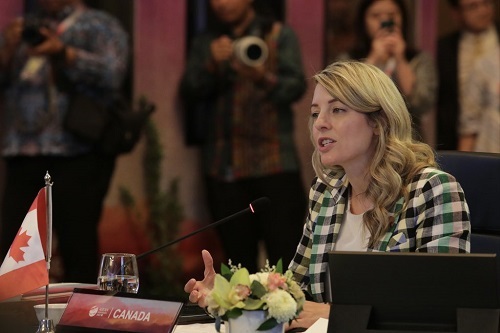Niger, Canada suspends financial assistance
TORONTO – The federal government has suspended direct financial assistance to the government of Niger after a military coup ousted President Mohamed Bazoum: Strongly condemning the coup, Canada’s Foreign Minister Melanie Joly has called for the reinstatement of the President Bazoum and the “democratically elected government”.
On Canada’s response, Andrew Rasiulis, a fellow at the Canadian Global Affairs Institute, told CTV News Channel on Sunday that he believes Canada has taken a “measured” step in suspending direct financial aid to the government of Niger. “I think they (Niger) understand that Canada has actually been quite moderate in this regard and therefore is not at the forefront” of this affair, Rasiulis said. “The question then becomes what will happen in Niger?” he added. “Are Nigeriens really going to ask Canada to leave? We’re not sure.”
However, the recent coup has also called into question the military assistance that Canada and other countries have provided to Niger. Western countries have seen Niger as a partner in the fight against extremists in the Sahel region, south of the Sahara desert, linked to al Qaeda and the Islamic State. The United States, France and other European countries have pledged hundreds of millions of dollars of military assistance to Niger, along with thousands of military personnel. And so did Canada as part of the operation known as “Operation Naberius”, during which the Canadian Armed Forces has sent up to 50 personnel to Niger every year since 2013 to train the Forces armées nigériennes, training which also involved Canadian Special Operations Forces.
A Department of Defense spokesman told The Globe and Mail that Canada’s Special Operations Forces command has not provided training to General Abdourahmane Tchiani, the recently installed head of state of Niger, nor to General Moussa Salaou Barmou, head of the Niger Special Forces and suspected coup leader.
But there are those who argue that that operation turned out to be a sort of boomerang. Aurel Braun, a professor of international relations and political science at the University of Toronto, told CTV News Channel on Sunday that Canada’s policy in Niger, while well-intentioned, “clearly has not achieved the desired results because a democratically elected government has been overturned. And I think that’s a very strong indication that something has fundamentally gone wrong,” he said.
However, Braun adds that it is not just Canada, but also the collective West that has not handled the situation well. “Dictatorships advance, and democracies need to get better at supporting democratic governments, making them more resilient and making them more popular to the extent that external forces can do it.”
In the pic above, Foreign Affairs Minister Melanie Joly (photo from Twitter – @melaniejoly)




